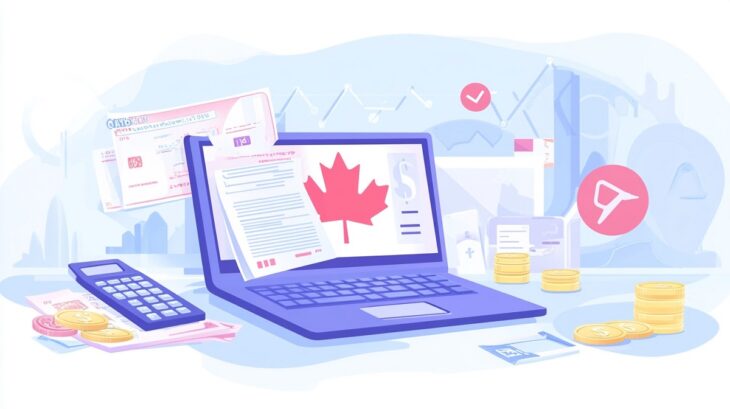Taxes apply to all sources of income in Canada, including money earned online. Freelancing, e-commerce, content creation, and other internet-based work require proper reporting to the Canada Revenue Agency. Ignoring tax obligations can lead to penalties, so knowing the rules is necessary.
Many people earn money through different online activities, including gaming and digital services. Even online gambling exists as a source of income, though casual players usually do not pay taxes on winnings. Checking the most popular gambling sites in Canada and their recent review can help those interested find the best options.
Filing taxes for online income does not have to be difficult. Knowing the deadlines, tax brackets, and available deductions can help reduce the amount owed.
The article will cover everything needed to file earnings correctly and avoid unnecessary trouble with the CRA.
Who Must Report Online Income in Canada?

Every person earning money online in Canada must report it to the Canada Revenue Agency (CRA). No exceptions exist for small amounts or casual side gigs. The CRA considers online earnings as taxable income, just like money earned from a regular job.
What Counts as Online Income?
Any money earned through the internet qualifies as online income. Some common sources include:
- Freelancing – Writers, designers, programmers, and other professionals offering services online.
- E-commerce – Selling products through Shopify, Etsy, Amazon, or personal websites.
- Affiliate Marketing – Earning commissions by promoting products and services.
- Content Creation – Monetizing YouTube videos, streaming on Twitch, or earning ad revenue from blogs.
- Online Tutoring – Teaching through platforms like VIPKid or Outschool.
- Drop Shipping – Running an online store without handling inventory directly.
- Online Gambling – Casual gamblers usually do not owe taxes, but professional gamblers must report their winnings as business income.
Do You Need a Business to Report Online Income?
No business registration is required to report online income. Individuals earning money online must declare it as self-employment income. However, registering a business may provide tax advantages, such as claiming business expenses and reducing personal liability.
What Happens if You Do Not Report Online Earnings?
Failing to report income leads to penalties. The CRA can charge interest on unpaid taxes and impose fines. Repeated violations may trigger audits and legal action. The CRA uses advanced technology to track online income, including data from payment processors like PayPal, Stripe, and banks.
Key Tax Deadlines for Online Earners

Missing a tax deadline leads to penalties and interest charges. Every online earner in Canada must know the important dates set by the CRA.
Main Tax Filing Deadlines
- April 30, 2025 – The deadline for most Canadians to file tax returns and pay any taxes owed.
- June 15, 2025 – The deadline for self-employed individuals to file tax returns. However, any taxes owed must still be paid by April 30.
What Happens if You Miss the Deadline?
Filing late results in an automatic penalty of 5% of the balance owed, plus an additional 1% per month for every month the return remains unpaid, up to 12 months. Interest also applies to unpaid amounts.
Do You Need to File if You Earn Below the Taxable Amount?
Even if income falls below the taxable threshold, filing a tax return remains important. Low-income earners may qualify for tax credits and benefits, including:
- GST/HST Credit – Helps reduce sales tax costs.
- Canada Workers Benefit – Provides financial support to lower-income workers.
- Child Benefits – Parents must file to receive government child-related payments.
How to Avoid Last-Minute Tax Stress
- Keep Records Year-Round – Store invoices, receipts, and bank statements.
- Use Tax Software – CRA-certified software simplifies the process.
- Consider a Tax Professional – Experts ensure accuracy and find deductions.
How to Calculate Taxes on Online Earnings
Knowing how much tax to pay on online income prevents surprises and financial trouble. Canada uses a progressive tax system, meaning higher earnings lead to higher tax rates.
Federal Tax Brackets for 2025
The federal government taxes income in tiers:
- 15% on income up to $57,375
- 20.5% on income over $57,375 up to $114,750
- 26% on income over $114,750 up to $177,882
- 29% on income over $177,882 up to $253,414
- 33% on income over $253,414
How Online Income Affects Your Tax Rate
Example: If someone earns $80,000, the first $57,375 gets taxed at 15%, and the remaining $22,625 gets taxed at 20.5%. The CRA calculates total tax based on income brackets, not a flat rate.
Self-Employment Tax Obligations
Unlike salaried employees, online earners do not have taxes deducted automatically. Self-employed individuals must:
- Pay the full CPP (Canada Pension Plan) contribution – 11.90% of net income over $3,500.
- Set aside money for income taxes – A good rule is to save 25-30% of earnings for taxes.
- Make quarterly tax payments if required – If tax owed exceeds $3,000 in previous years, the CRA may require advance payments in March, June, September, and December.
Sales Tax (GST/HST) on Online Earnings
Self-employed individuals earning over $30,000 in a year must register for a GST/HST number and charge sales tax on services and digital products. Failure to do so may result in fines and unpaid tax liabilities.
Deductible Expenses That Reduce Taxes

Online earners can lower taxable income by claiming business expenses. Deductible costs must be directly related to earning income.
Common Tax Deductions for Online Earners
- Home Office – If part of a home is used for work, a percentage of rent, mortgage interest, property taxes, and utilities can be deducted.
- Internet and Phone Bills – The portion used for business can be written off.
- Software and Subscriptions – Expenses for tools like Adobe, QuickBooks, and web hosting qualify.
- Advertising Costs – Paid promotions on Google, Facebook, and other platforms count as business expenses.
- Office Supplies – Items like printers, paper, and furniture used for work qualify.
- Professional Fees – Hiring accountants, consultants, or legal professionals is deductible.
- Education and Training – Courses, certifications, and online training programs related to work can be claimed.
Example: How Deductions Lower Taxes
If someone earns $60,000 from freelancing and has $10,000 in business expenses, taxable income drops to $50,000. This reduces the total tax bill.
What Cannot Be Deducted?
- Personal expenses unrelated to business.
- Clothing, unless required for work (e.g., uniforms).
- Meals and entertainment (only 50% of business-related meals count).
Filing Taxes Online or on Paper – Which Works Best?
The CRA offers two ways to file tax returns: online and paper. Online filing provides faster processing, but some people still prefer paper returns.
Online Filing – The Faster and Easier Option
Most Canadians file online using NETFILE, the CRA’s electronic tax submission system. Benefits include:
- Faster Refunds – Returns get processed in as little as 8 business days.
- Fewer Errors – Certified tax software automatically calculates amounts.
- Instant Confirmation – The CRA confirms receipt immediately.
- Access to Past Returns – The CRA’s My Account service stores previous tax filings.
Best Tax Software for Online Filing
The CRA certifies multiple software options, including:
- Free Options – Wealthsimple Tax, TurboTax Free, StudioTax.
- Paid Options – TurboTax, UFile, H&R Block (offers advanced support and automatic deduction calculations).
Paper Filing – When It Makes Sense
The CRA still allows paper returns, but they take much longer. Processing can take 10 to 12 weeks. Paper filing works best for:
- People with very simple tax situations.
- Those who do not have access to computers or reliable internet.
- Individuals who prefer physical records for their files.
How to File by Paper
- Download or request a T1 General tax package from the CRA website.
- Fill out the necessary forms.
- Mail the completed return to the nearest CRA tax centre.
Mistakes That Lead to Penalties and How to Avoid Them
Tax errors can lead to penalties, audits, and delays. Many online earners make mistakes that cost them money.
Common Tax Mistakes Online Earners Make
- Forgetting to Report Income – The CRA receives reports from payment platforms like PayPal, Stripe, and banks. Hiding income leads to penalties.
- Missing the Deadline – Late filing triggers a 5% penalty on the balance owed, plus 1% per month in interest.
- Not Keeping Receipts for Deductions – Claiming expenses without proof can lead to denied deductions. Keep digital and physical copies of receipts.
- Misclassifying Income – Some online workers wrongly report business income as personal income. The CRA treats self-employed income differently.
- Ignoring GST/HST Requirements – Earning over $30,000 means GST/HST registration is mandatory. The CRA fines businesses that fail to comply.
How to Avoid Penalties and Audits
- Report Everything Accurately – The CRA matches reported income with third-party sources.
- Keep Good Records – Store receipts, invoices, and bank statements for at least six years.
- Use Reliable Tax Software – CRA-certified programs reduce errors.
- Consult a Tax Professional – Accountants and tax specialists help maximize deductions and prevent costly mistakes.
Provincial Tax Differences That Affect Online Earners

Taxes in Canada do not stop at the federal level. Each province and territory has its own income tax rates, which get added to the federal tax owed. The total tax bill depends on where you live and earn income.
- Ontario: 5.05% on the first $51,446, then 9.15% up to $102,894.
- British Columbia: 5.06% on the first $47,937, then 7.7% up to $95,875.
- Alberta: Flat 10% up to $142,292.
- Quebec: 14% on the first $49,275, then 19% up to $98,540.
- Nova Scotia: 8.79% on the first $29,590, then 14.95% up to $59,180.
How Provincial Taxes Impact Online Income
A freelancer in Alberta earning $100,000 pays 10% provincial tax. A freelancer in Quebec at the same income level pays 19%. Location significantly affects take-home income.
Provincial Sales Tax (PST) and Online Work
If selling digital products or services, some provinces require charging provincial sales tax (PST) in addition to GST/HST.
- British Columbia: 7% PST
- Saskatchewan: 6% PST
- Manitoba: 7% PST
- Quebec: 9.975% QST (Quebec Sales Tax)
Side Hustles and Small Online Businesses – Tax Rules You Must Know
Many people earn extra money online through side hustles or small businesses. The CRA still expects tax payments, no matter how small the income.
Is a Side Hustle Considered Business Income?
A side hustle becomes business income if it is done with the intent to make money. Examples include:
- Selling handmade goods on Etsy.
- Freelancing as a graphic designer.
- Running an online coaching service.
- Selling digital products like e-books or courses.
Even occasional earnings count. The CRA expects all income to be reported.
When to Register a Business for Taxes
Registering a business is not required to declare side hustle income. However, if earnings exceed $30,000 in a year, the business must register for GST/HST and charge tax on sales.
Business Tax Deductions for Side Hustles
Side hustlers can claim business expenses to lower taxes. Common deductions include:
- Website costs – Hosting, domain registration, website maintenance.
- Marketing and advertising – Facebook ads, Google ads, influencer promotions.
- Equipment – Laptops, cameras, microphones for content creation.
- Training and courses – Business-related education expenses.
FAQs
Do Online Gift Cards or Store Credit Count as Taxable Income?
Yes, if received as payment for work or services. The CRA considers gift cards and store credit as non-cash income, which must be reported at fair market value. However, personal gifts from friends or family remain tax-free.
What Happens if You Get Paid in Cryptocurrency?
The CRA treats cryptocurrency as a commodity, not currency. If paid in Bitcoin, Ethereum, or any other cryptocurrency, the value in Canadian dollars at the time of receipt must be reported as income. If the crypto is later sold for profit, capital gains tax applies.
Do You Need to Pay Taxes if Your Clients Are Outside Canada?
Yes, Canadian residents must report worldwide income, including money from foreign clients. However, tax treaties may prevent double taxation. If foreign tax was already paid, a foreign tax credit may reduce the amount owed to the CRA.
Can You File Taxes If You Do Not Have a T4 Slip?
Yes, T4 slips come from employers, but self-employed individuals and online earners do not receive them. Income must still be reported using records such as PayPal statements, Stripe transactions, invoices, and bank deposits. The CRA does not require a T4 to file taxes.
Does the CRA Track Online Marketplaces Like eBay or Facebook Marketplace?
Yes, the CRA has agreements with platforms like eBay, Etsy, and Amazon to receive income data. Occasional personal sales are tax-free, but selling items regularly for profit is considered a business and must be reported. The CRA can request transaction history for tax audits.
The Bottom Line
Earning online does not mean skipping taxes. The CRA expects all income to be reported, no matter how small. Whether freelancing, selling products, or running a side hustle, proper tax filing prevents penalties and financial trouble.
Deadlines, tax brackets, and deductions all play a role in how much tax is owed. Keeping accurate records, filing on time, and using available tax breaks can reduce the final bill. Ignoring tax rules leads to fines, interest charges, and possible audits.


